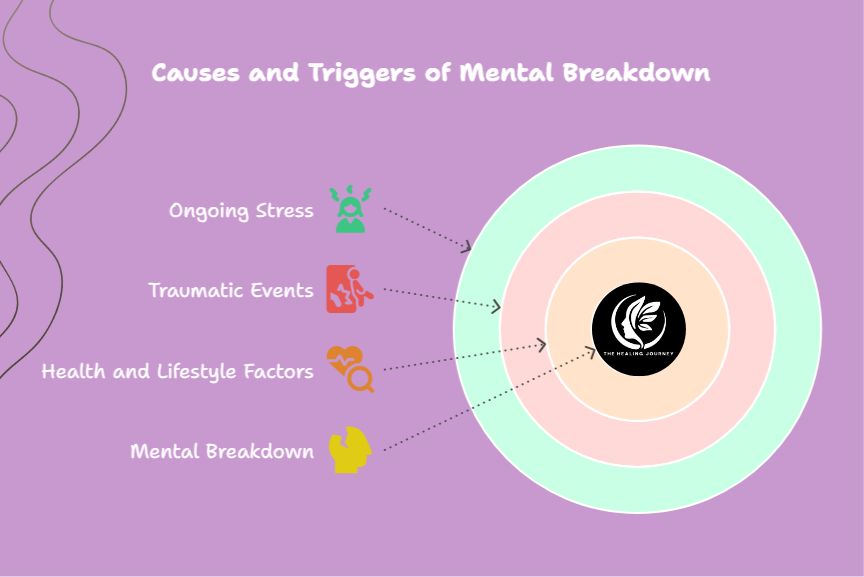Mental breakdown symptoms can appear suddenly or slowly, affecting your mind, body, and daily life. Many people feel very stressed, tired, or anxious without realizing these signs may point to a bigger problem. Spotting symptoms early, like mood swings, trouble focusing, fatigue, or physical tension, can help prevent a full-blown mental health crisis. Recognizing these signs is crucial for obtaining the proper assistance. Simple steps, self-care, and guidance from trained mental health professionals can make a big difference. In Australia, services like The Healing Journey provide support for anyone facing stress, anxiety, or burnout. This guide explains common mental health warning signs, emotional and cognitive symptoms, and includes information on how to seek help. It gives clear steps to take toward recovery and well-being.
What Is a Mental Breakdown?
A mental breakdown happens when stress, emotional pressure, or anxiety becomes too overwhelming. It is not a formal medical diagnosis, but people often use it to describe feeling completely unable to cope. Daily tasks may feel impossible, and both the mind and body can show signs of strain. Understanding a mental breakdown helps you spot early warning signs and seek support from mental health professionals. In Australia, services like The Healing Journey help people manage stress, emotional exhaustion, and anxiety.
Emotional and Cognitive Signs
During a mental breakdown, emotions can feel extreme. People may experience sadness, irritability, or emotional numbness. Thoughts might race, memory can weaken, and focusing on tasks becomes hard. Anxiety or constant worry is common. These cognitive and emotional symptoms make everyday life feel overwhelming.
Physical Signs of Mental Breakdown Symptoms
A mental breakdown can also affect the body. Common physical symptoms include headaches, fatigue, sleep problems, rapid heartbeat, and stomach issues. These signs often appear alongside emotional distress. Ignoring them can slow down recovery, so noticing them early is crucial.
Behavioural Changes
Stress may change how people act. Avoiding work, school, or family responsibilities, social withdrawal, and neglecting self-care are frequent. These behavioral changes show that stress has reached a serious level and that help may be needed.
Common Mental Breakdown Symptoms
When a mental breakdown happens, the signs can show up in many ways. These symptoms can impact your emotions, thoughts, body, and daily activities. Learning to spot these early can help you take the proper steps to get support and prevent things from getting worse.

Emotional Symptoms
Emotional changes are often the first signs that something is wrong. These feelings can come on suddenly or build up over time:
- Intense sadness or hopelessness
- Extreme irritability or mood swings
- Feeling overwhelmed or emotionally numb
- Sudden crying spells
These emotions may feel hard to control. Simple things that never bothered you before may start to trigger strong reactions. This can have a significant impact on your relationships and daily life.
Cognitive Symptoms
Mental breakdowns also affect how you think. Your mind may feel cloudy or overactive. Some common signs include:
- Difficulty concentrating or making decisions
- Racing thoughts or mental fog
- Memory issues
- Feeling detached or “not yourself”
You may find it hard to focus at work or school. Every day decisions can start to feel impossible. Some people even describe it as “watching life happen from a distance,” which can be very unsettling.
Physical Symptoms
Emotional stress often shows up in the body. Many people notice changes in how they feel physically:
- Headaches, body aches, or fatigue
- Sleep disturbances (insomnia or oversleeping)
- Stomach problems, nausea, or appetite changes
- Rapid heartbeat or shortness of breath (can overlap with anxiety attack symptoms Anxiety Attack vs Panic Attack)
These symptoms are genuine and not “just in your head.” Your body responds to emotional stress in strong ways.
Behavioural Symptoms
Changes in behavior can be another clear sign:
- Withdrawing from social contact
- Neglecting personal hygiene or responsibilities
- Sudden changes in daily routine
- Avoiding work, family, or essential tasks
When these patterns show up together, they can signal that someone is experiencing a mental health crisis. Spotting these signs early and seeking help can make recovery much easier.
Early Warning Signs You Shouldn’t Ignore
A mental breakdown often doesn’t happen all at once. It typically develops over time through subtle changes in mood, thoughts, and behavior. By recognizing the early warning signs, you can take steps to manage stress and prevent a crisis. These signs may seem minor at first, but they often indicate deeper emotional strain. Seeking help from mental health professionals or trusted support services, such as The Healing Journey in Australia, can make a real difference.
Emotional and Mental Warning Signs
Early emotional signs can be easily overlooked. You may feel more irritable, sensitive, or sad without an apparent reason. Anxiety may rise slowly, showing up as worry or fear that doesn’t go away. It can also feel harder to control your emotions. Mentally, you might struggle to focus or find that your thoughts are constantly racing. These emotional and cognitive changes are often the first hints that your mind is under pressure.
Physical and Energy-Related Signs
Your body often gives signals before a complete breakdown happens. Physical symptoms, such as headaches, sleep disturbances, or persistent fatigue, may appear. You may feel drained even after resting. Some people notice stomach discomfort, muscle tension, or a faster heartbeat. These changes are your body’s way of saying something isn’t right. Paying attention to these early physical signs enables you to take action before stress worsens.
Behavioral and Social Changes
When stress builds, behavior often shifts in subtle ways. You might avoid social activities, lose interest in hobbies, or withdraw from family and friends. Productivity at work or school may drop. Daily routines can feel like a burden. These behavioral changes are often clear signals that emotional pressure is increasing. Talking to a therapist or reaching out to The Healing Journey for support can help you manage these early changes before they develop into something more serious.
Causes and Triggers of a Mental Breakdown
A mental breakdown is not caused by one single thing. It typically occurs when multiple stress factors accumulate over time. These triggers can be emotional, physical, or environmental in nature. Understanding what leads to a breakdown can help you address the real issues early. With the proper support from trusted mental health professionals and services like The Healing Journey in Australia, it’s possible to reduce the impact of these triggers and protect your mental well-being.

Ongoing Stress and Emotional Pressure
One of the most common causes is chronic stress. When stress builds day after day without proper rest, it affects both your mind and body. High workloads, financial struggles, relationship problems, or personal loss can all add emotional weight. Over time, this pressure can overwhelm your ability to cope with it. You may notice anxiety, mood swings, or trouble concentrating. If these signs are ignored, they can grow into serious mental health challenges, including burnout or emotional collapse.
Traumatic Events and Sudden Life Changes
Trauma and sudden life changes can trigger intense emotional reactions. This includes the death of a loved one, a serious accident, or unexpected job loss. Such experiences shake your sense of safety and stability. Even if the event happened in the past, unresolved trauma can resurface during stressful periods. This emotional shock can weaken your ability to manage daily life, increasing the risk of a mental breakdown if the trauma remains unaddressed.
Health Issues, Sleep Problems, and Lifestyle Factors
Your physical health and daily habits also play a significant role in your overall well-being. Poor sleep, lack of exercise, or an unbalanced diet can affect mood and resilience. Long-term medical conditions or untreated mental health disorders like depression or anxiety can increase vulnerability to breakdowns. Substance use, isolation, or a lack of routine can exacerbate the situation. Taking care of your health, seeking regular check-ups, and building supportive daily habits can help reduce these risks.
Common Emotional and Psychological Symptoms
Mental breakdown symptoms often show up through emotions and thoughts before they affect the body. Many people feel intense emotional changes but do not realise how serious these shifts can become. Identifying these early signs can help prevent a more severe crisis. Support from mental health professionals and services, such as The Healing Journey in Australia, can facilitate a smoother and faster recovery.
Overwhelming Anxiety and Constant Worry
One of the first signs is persistent anxiety. You may feel tense, restless, or uneasy, even without an apparent reason. Minor problems start to feel huge. Worrying becomes constant and hard to control. This ongoing state of alert can drain your energy and focus. Many people describe it as feeling “on edge” all the time. If left unchecked, this level of anxiety can lead to panic attacks, sleep problems, and emotional exhaustion. Recognising this early is a key step toward seeking the proper support and calming your mind.
Sudden Mood Swings and Irritability
During a mental breakdown, emotional stability often weakens. You might shift from feeling sad to angry or tearful within minutes. Simple tasks or conversations can trigger strong reactions. These mood swings may cause confusion for both you and those around you. Irritability becomes more common, making it harder to cope with stress. This emotional rollercoaster is a clear sign that your mind is under pressure. Understanding that these changes are symptoms, not personal flaws, helps reduce shame and opens the door for honest conversations with trusted people or therapists.
Feeling Numb, Detached, or Hopeless
Another common symptom is emotional numbness. You may feel disconnected from your surroundings or from your own emotions. Activities you once enjoyed might no longer bring joy. Many people describe it as “shutting down” or “going blank.” Along with numbness, feelings of hopelessness or worthlessness can grow. These thoughts can make daily life feel overwhelming and meaningless. At this stage, talking to a mental health expert is crucial. Early help can stop these feelings from deepening into depression or a more serious mental health crisis.
When to Seek Professional Help
Knowing when to ask for help is just as important as recognising the symptoms. Some signs show that the situation has reached a severe stage. At this point, early support from mental health professionals can prevent things from getting worse and help you find a clear path to recovery.
Signs That Need Immediate Attention
If you have suicidal thoughts, thoughts of harming yourself, or feel like you cannot keep up with daily life, it’s time to act quickly. Other severe signs include constant panic attacks, extreme mood changes, or not being able to work, study, or manage basic tasks. These signs are not weaknesses. There are clear warnings that you need urgent support. Contracting to a trusted professional or helpline in Australia is a vital step.
Early Support Makes a Difference
You do not have to wait for a crisis to seek help. Speaking to a therapist or counsellor early can ease emotional pressure and stop symptoms from growing. Mental health support offers tools to manage stress, improve emotional balance, and rebuild confidence. Getting help early often leads to faster recovery and better long-term outcomes.
Types of Therapy and Getting Support
In Australia, several effective therapies are available. These include Cognitive Behavioural Therapy (CBT), talk therapy, and group support sessions. Each option focuses on helping you manage thoughts, emotions, and behaviours in healthy ways. Services like The Healing Journey connect individuals with experienced professionals who provide personalized care. If you notice worrying symptoms, consider booking an appointment to get the proper support early.
How Therapy Can Support Your Recovery
Therapy plays a key role in mental health recovery. It gives you tools to understand your thoughts and emotions, manage stress, and work through deeper issues. With guidance from a qualified mental health professional, you can rebuild emotional balance and take steady steps toward healing.
Learning Emotional Regulation and Coping Skills
Therapy helps you learn how to manage strong emotions in a healthy way. You gain practical skills to handle anxiety, stress, and mood swings without feeling overwhelmed. These techniques can include relaxation exercises, grounding methods, and clear thinking patterns. Over time, this support helps build emotional strength and makes daily challenges easier to manage.
Addressing Root Causes, Not Just Symptoms
A therapist doesn’t only focus on surface problems. They help uncover the root causes of emotional distress. This may include unresolved trauma, ongoing stress, or unhelpful thinking habits. By understanding the origin of symptoms, you can make meaningful changes. This deeper work lays a strong foundation for lasting mental health improvement.
Recovery Is Possible With the Right Support
Talking to a qualified therapist provides a safe and supportive space. Many people find that therapy brings hope, clarity, and structure to their healing process. It’s proof that recovery is possible with consistent support. In Australia, options like Cognitive Behavioural Therapy (CBT) and talk therapy are widely available through trusted services such as Mental Breakdown Treatment, Anxiety Therapy, and CBT Therapy.
Self-Care Tips to Manage Stress and Prevent Breakdown
Taking care of your mind and body each day can lower stress and reduce the risk of a mental breakdown. Small, steady actions build emotional strength over time. These steps are most effective when combined with support from mental health professionals or services, such as The Healing Journey in Australia.

Prioritise Sleep, Rest, and Relaxation
A good night’s sleep is one of the strongest ways to protect your mental health. A regular sleep routine helps balance mood, focus, and energy levels. Aim for sufficient rest each night and take short breaks during the day. Gentle relaxation methods, such as deep breathing or stretching, can help calm your mind and ease stress. Even a few quiet minutes can make a difference.
Build Healthy Connections and Clear Boundaries
Strong social support plays a key role in mental well-being. Talking to trusted friends, family, or support groups can bring comfort and reduce feelings of isolation. It’s also essential to establish realistic boundaries between work, relationships, and personal tasks. Saying “no” when needed and managing your workload helps prevent emotional overload. These small boundaries protect your energy and give you space to recover.
Use Mindfulness and Seek Professional Guidance
Simple mindfulness exercises, such as focusing on your breathing or paying attention to your surroundings, can help bring your mind back to the present moment. These practices help reduce stress and manage emotions before they escalate. Self-care is most effective when combined with professional support. Speaking with a therapist or counsellor adds structure, tools, and expert insight that self-help alone cannot provide. Services such as The Healing Journey offer guidance and therapy options tailored to individual needs.
Final Thoughts
A mental breakdown can feel overwhelming, but it does not have to define your future. Recognising the signs early, taking care of your mental health, and reaching out for support can help you find balance again. With proper care, recovery is not only possible but also a reality.
Simple steps, such as getting enough rest, setting healthy boundaries, and practicing mindfulness, can make daily life feel more manageable. But self-care alone may not be enough for everyone. Working with trusted mental health professionals offers structured guidance, emotional support, and proven therapeutic methods that lead to lasting change.
If you or someone you care about is struggling, reaching out is a strong and meaningful step. At The Healing Journey, compassionate professionals offer a range of therapy options, including CBT, talk therapy, and tailored support to help you move forward with confidence.
Take that first step toward healing today. Please book an appointment or visit our Mental Breakdown Treatment page to find the support that best suits your needs.
FAQs About Mental Breakdowns and Recovery
What is a mental breakdown?
A mental breakdown is a period when someone feels unable to cope with daily stress or emotions. It’s not a medical term, but it often involves intense anxiety, emotional overwhelm, or sudden changes in behaviour. Professional support can help identify the root cause and guide the recovery process.
How do I know if I’m having a mental breakdown?
Common signs include persistent stress, emotional outbursts, withdrawal from others, difficulty concentrating, and insomnia. Some people also experience panic attacks or physical symptoms. If these signs affect your daily life, it’s time to seek support from a mental health professional.
Can therapy really help during a breakdown?
Yes, therapy is one of the most effective ways to manage and recover from a mental breakdown. Therapists use techniques like CBT (Cognitive Behavioural Therapy), talk therapy, and stress management strategies to help regulate emotions, build coping skills, and address root causes.
Are self-care strategies enough to recover?
Self-care plays a significant role, but for many people, it works best when combined with professional help. Simple steps, such as rest, mindfulness, and setting healthy boundaries, can help reduce stress. However, therapy provides structured guidance and long-term tools for achieving emotional stability.
When should I seek professional help?
You should reach out for help if your symptoms feel intense, last for weeks, or affect your ability to function. Seek immediate support if you have thoughts of self-harm or suicide. Early professional care leads to faster and stronger recovery.
